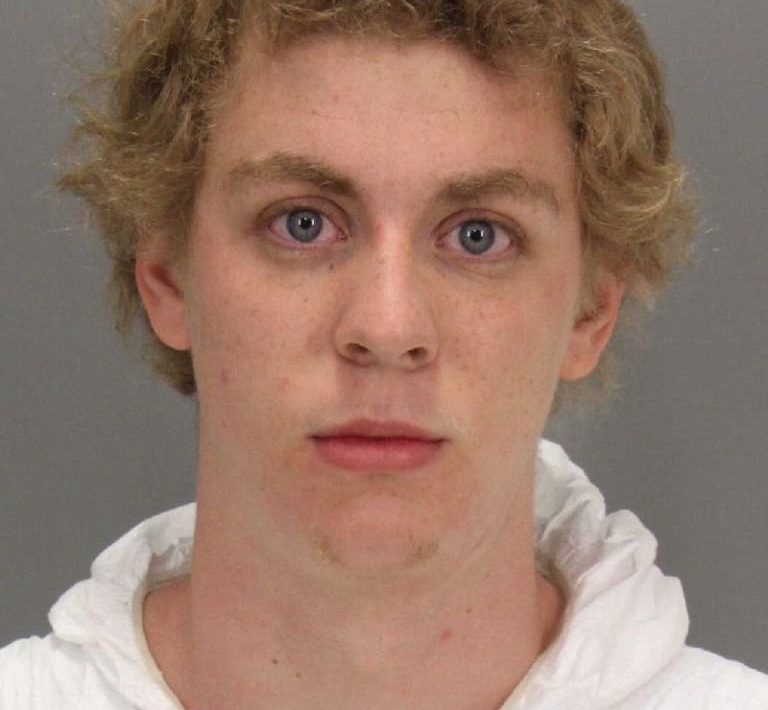Brock Allen Turner was found guilty of three charges of felony sexual assault in the high-profile criminal case People v. Turner. And is also known as The People of California v. Brock Allen Turner (2015). So, if you want to know every minute detail of Brock Turner now, read further without delay!
Did you know About Brock Turner?
What's in this article...
Brock Turner was born in Dayton, Ohio, on August 1, 1995. 2014 saw his Oakwood High School graduation. During his arrest, Turner was a 19-year-old Stanford University freshman engaged on a swimming scholarship.
In a memo submitted to the court before sentencing, the prosecution detailed Turner’s history of drug and alcohol use at Stanford and high school. Furthermore, on Turner’s mobile phone, the report said, police discovered images and messages that showed heavy drug use, including LSD, ecstasy, marijuana extracts, and excessive alcohol. Turner was detained in 2014 for alcohol possession while underage.
Therefore the woman Turner was found guilty of assaulting was referred to as “V01” in the incident’s redacted police report, “Jane Doe” in the indictment, and “Emily Doe” and “Jane Doe 1” by local and regional newspapers, including the San Jose Mercury News, the Stanford Daily, and the Palo Alto Weekly, according to California court and U.S. media conventions. Additionally, Doe was a 22-year-old graduate of a different institution at the time of her assault.

Brock Turner Now: What happened that night?
In the United States, the name Brock Turner has come to be associated with the problem of sexual abuse. Therefore, Turner attended Stanford University in 2015 and competed on the swimming squad. Therefore, he was detained and accused of assaulting a sleeping lady behind a dumpster near a fraternity party.
The case’s specifics are horrifying. Because of the party’s alcohol consumption, the victim, known only as “Emily Doe,” could not give her permission to engage in sexual activity. Additionally, two Swedish graduate students biking by the incident discovered Turner on top of her. Turner was stopped and held until the cops showed up.
During the trial, Turner’s defence team contended that the sexual activity was consensual and that the victim gave verbal and nonverbal permission. However, the victim could not testify because she had no recollection of the incident. Turner was convicted on three charges of felony sexual assault despite this.
Due to Turner’s light sentence, the case attracted a lot of media interest. Given that a longer sentence would have a “severe impact” on Turner’s prospects for the future, Judge Aaron Persky only gave Turner a six-month prison term. In fact, gi
ven the seriousness of the crime and its effects on the victim, many people criticized this punishment for being too lenient.
So, the victim responded to the punishment with a stirring statement that quickly gained popularity. Furthermore, she described how the assault affected her life in the news, criticizing the legal system for not doing enough to safeguard victims of sexual assault.
Did the court release Brock Turner Now?
The declaration was praised widely for its courage and sincerity, and it played a part in igniting a national dialogue on the subject of sexual abuse.
The case also raised important issues regar
ding the function of privilege and power in the judicial system. Moreover, some claim that Turner’s lenient punishment was partly due to his wealthy family background and access to excellent legal counsel. However, many sexual assault victims come from underprivileged homes and might not have the same access to legal aid.
Following the case, there were demands for Judge Persky’s dismissal from his post. Also, Persky’s resignation was accepted after the start of a recal

l movement. California passed legislation to close a loophole that had permitted some perpetrators to receive light sentences for sexual assault, which also changed the state’s legal system.
Brock Turner Now: The Documentary
These results back Rebecca Richman Cohen’s sober new documentary, “The Recall: Reframed,” which debuted on MSNBC on March 19 and is currently streaming on NBC. Moreover, it critically examines the Persky recall from the mass imprisonment perspective.
Although Harvard Law School professor Richman Cohen started planning and agoradesign.it filming “The Recall: Reframed” before the pandemic, she told me that the racial-justice uprisings of 2020 “opened the doors to having a much more nuanced conversation”—one that would not necessarily pit support for sexual assault survivors against the movement to end mass incarceration.
“It opened up the possibility to see how you could deeply care about both of those things and frame them so they didn’t conflict with one another,” she said.
Interviews with prominent recall opponents are included in Richman Cohen’s film. One such interviewee is Cordell, who claims she realized during the recall campaign that “the community, the public, and the media” were “being misled, and those of us who know this need to speak out.”
The Pervasiveness of Sexual Assault
According to Cordell, the public narrative used by those calling Persky to be dismissed—that he had a history of handing down light sentences in instances of violence against women—was based on five “cherry-picked” cases over ten years.
However, a disturbing number of Persky’s cases show poor judgment in cases involving gender-based violence, especially when the perpetrators were college athletes, Dauber wrote in her email.
She cited examples where Persky agreed to postpone a defendant’s sentence after finding him guilty of felony domestic abuse so that he could play football at the University of Hawaii and where Persky permitted pictures of the alleged victim in lewd poses at a party months after an alleged gang rape involving players from the De Anza College baseball team.
The Brock Turner now case serves as a sobering reminder of the pervasiveness of sexual assault in our culture and the necessity of a just system that treats these offences seriously. Hence, it serves as a reflection of the strength of survivors to stand up for themselves and demand change.
Brock Turner Now: The consciousness after the event

Even though there is still much to be done, the case of Brock Turner now paved the way for significant reforms and increased consciousness of sexual assault.
The incident also clarified the value of consent instruction and the need for colleges to do more to stop sexual assault on their campuses. Following the incident, Stanford University enacted several new sexual assault policies, one of which mandates that all incoming students pass an online course on sexual assault prevention.
Sexual assault is still a widespread issue in the United States, despite these improvements. As a result, the Rape, Abuse & Incest National Network (RAINN) estimates that a sexual assault occurs in America every 73 seconds and that only 5 out of 1,000 offenders are sentenced to jail. In conclusion, the Brock Turner now case is a sobering warning that more needs to be done to stop sexual assault and ensure that those who are assaulted get justice.
The incident raised significant issues regarding the relationship between racism and sexual assault. Turner received a lot of criticism for his actions. Still, some people felt that the media coverage and outrage surrounding it were out of proportion to the instances involving Black and Brown perpetrators. This disparity in coverage demonstrates how privilege and racial bias can affect how sexual assault cases are viewed and handled by the media and the judicial system.
The broad range of outcomes
The three main characters’ outcomes in the Brock Turner trial have had a broad range of products ever since. Following his recall, Persky was hired by a San Jose high school to teach the junior varsity girls’ tennis team. But after his hiring was made public, a petition distributed by students calling for his dismissal received more than three thousand signatures, and he was fired. Brock Turner now was freed after completing three months of a six-month sentence even before the recall issue for Persky appeared on the ballot.
He relocated to his parent’s house in Ohio. Moreover, he must register as a sex offender every 90 days at the local sheriff’s office for the rest of his life and make his name and location available to the public on the state’s sex-offender registry. In 2019, when Persky was fired from his job as a tennis instructor, Emily Doe came forward and identified herself as Chanel Miller.
She then wrote a memoir titled “Know My Name” about the sexual assault and its consequences, including the criminal case. Furthermore, the National Book Critics Circle Award for autobiography was given to her book. Miller hasn’t made the recall the focus of her narrative or activism.
Compared to 2016, the landscape of opinions on sexual attacks and criminal punishment is much more nuanced.
Additionally, the debate over whether we want judges to be autonomous or sensitive to public opinion has been muddled by the unpopular Roe v.
Wade decision. Before they became so deliberately ambivalent, the Persky recall was a conglomeration of problems. Its moral outrage made the possibility of unintended repercussions seem unlikely. As the district attorney explains in the movie, many things will get burned when a fire starts.
Brock Turner Wiki and Biography |
|
| Real Name | Brock Allen Turner |
| Nickname | Brock Turner |
| Profession | Student |
| Age | 28 |
| Date of Birth | August 1, 1955 |
| Birthplace | Dayton, Ohio |
| Nationality | United States |
| Hometown | Dayton, Ohio |
| Zodiac Sign | Leo |
| Ethnicity | Information Is not known |
| Famous For | People V. Turner Case |
Height, Weight, and Body Measurements |
|
| Height in Centimeters | 195.58 |
| Height in Meters | 1.9558 meters |
| Height in Inches | 6 feet 5 Inches |
| Weight in Kilograms | 95.254 |
| Weight in Pounds | 209.439 |
Family and Relatives |
|
| Father | Dan Turner |
| Mother | Carleen Turner |
| Brother | Not Much Information Is Available |
| Sister | Not Much Information Is Available |
| Sister’s Spouse | Not Much Information Is Available |
Education and School, College |
|
| Educational Qualification | Stanford University |
| College | Graduated |
| School | Oakwood High School |
Money Factor |
|
| Net Worth | $5 Million |
| Salary | Not Much Information Is Available |
| Career Earning | Not Much Information Is Available |
| Cars | Not Much Information Is Available |
| Other Properties | Not Much Information Is Available |
Lucky Things |
|
| Lucky Color | Not Much Information Is Available |
| Lucky Stone | Not Much Information Is Available |
| Lucky Number | Not Much Information Is Available |
Contact Address |
|
| House Location | Not Much Information Is Available |
| Phone Number | Not Much Information Is Available |
| Email Id | Not Much Information Is Available |
| Website | Not Much Information Is Available |
Conclusion
In conclusion, the case of Brock Turner now is a potent illustration of the effects that sexual abuse can have on victims and society. There is still much to be done to prevent sexual assault and ensure survivors receive justice, even though the case garnered significant media coverage and resulted in substantial reforms. It is up to us all to keep speaking out against sexual assault and strive toward a time when everyone is respected and treated with dignity.





